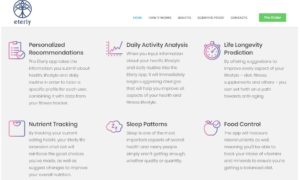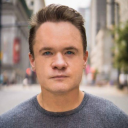Longevity is Real Business: Interview with Eterly’s Founder Andrew Ahachinsky

Is 80 really becoming the new 60? The quest for longevity is deep in human nature. From seeking miracle pills to practicing various forms of meditation, we as human are always in the hunt to extend lifespan and maximize life joy. The secret to longevity has long been a mystery, but it doesn’t stop entrepreneurs from trying to discover it through science and technology. Google’s Calico, Human Longevity Inc., and Unity Biotechnology are just a few examples of ambitious entrepreneurs and tech giants that try to tap this challenge/opportunity.
Eterly, a startup based in Vancouver, is joining this race. Eterly’s solution, still in development, will consist of a front-end mobile app, a backend AI powered analytics engine based on its scientific research, and a blockchain-architectured data warehouse. What it offers to consumers is a personal longevity assistant—software backed by scientific research making personalized recommendations about healthy lifestyle that can lead to longer life. Eterly believes its solution is unique because it employs (in its own language)…
- A universal front-end mobile app aimed for all consumers
- A blockchain backend for R&D, using tokenisation to create incentivisation across the platform
- A trusted “open marketplace” model, where users can find curated, recommended and validated treatments and products (e.g., supplements, health foods, vitamins, lifestyle coaches)
- AI driven health and fitness analysis and recommendation system for healthy diet, lifestyle regimes, nutraceuticals and AI-driven personalized precision medical advice provision.
I have the opportunity to ask Andrew Ahachinsky, Eterly’s CEO and founder, a few critical business-related questions, and below is a summary of our conversation (edited for clarity and brevity).
DigitalHealthInvestor.com: What is your solution’s value?
Andrew: The problem in today’s market is that no solution provider is pursuing longevity as a market opportunity in a comprehensive way. Some are targeting this market with a medical device, some with a fitness tracking gadget or app. The truth is everyone is narrowly focused, without a complete approach in terms of how best to guide consumers to pursue this ultimate goal.
 Our goal and value is to provide consumers with this one place for life extension and healthy living. Our value is first from our academic research—our data scientists are working on analysis related to lifestyle--sleep, activity, stress, food intake, etc. We are trying to find out which particular factors are affecting longevity as well as correlations of these factors. It is more than about whether this nutrient is good or bad for you, rather, how this nutrient intake works in conjunction with activity, sleep, or stress—how these things are correlate with one another and affect longevity. To have that, you would need a lot of hard work, and we’ve done that. We trained our AI to identify these things and once input is in, we can perform the analysis and offer a very simple recommendation that he or she can follow and then help them improve it as they progress along.
Our goal and value is to provide consumers with this one place for life extension and healthy living. Our value is first from our academic research—our data scientists are working on analysis related to lifestyle--sleep, activity, stress, food intake, etc. We are trying to find out which particular factors are affecting longevity as well as correlations of these factors. It is more than about whether this nutrient is good or bad for you, rather, how this nutrient intake works in conjunction with activity, sleep, or stress—how these things are correlate with one another and affect longevity. To have that, you would need a lot of hard work, and we’ve done that. We trained our AI to identify these things and once input is in, we can perform the analysis and offer a very simple recommendation that he or she can follow and then help them improve it as they progress along.
We position our solution as a personal longevity assistant—it is different from coaching in that this assistant doesn’t instruct users to do things like a coach does, but reminds, suggests, and recommends. In a nutshell, by using our solution, we are taking the hardest learning part from consumers (on how to extend life), and just ask them to follow our advice about the best behaviors.
Once a user starts to use it for some time, like for a month, he would notice differences in his personal life, could be his blood pressure level, sleep quality etc., things people can feel, or an outsider can tell and point out to them. This type of change may not be measurable through a specific biomarker—in fact, we do not have any better biomarker than are available already, at least for now.
One thing I want to stress is that we are not replacing what people are doing today with our solution—rather, we offer them a scientifically validated approach and guidance. People may over-exercise, take the wrong supplements, eat too much red meat, etc., things that not help them improve longevity in the long run. We are going to help them stitch this knowledge and actions together. Honestly, I haven’t see many people doing right in this market yet.
DigitalHealthInvestor.com: if your app will give advice, how does doctor fit in here?
Andrew: Doctors are important partners and consumers are free to consult with their doctors. We are focusing on providing lifestyle advice, not health or medical advice. The FDA would intervene if we do the latter. Our app can also recommend specific biomarkers for consumers to test and they can get their doctor to prescribe such services, or we can connect them to qualified test providers. Either way, we are not competing with doctors, rather complimenting their services. In fact, doctors would appreciate our data and we are happy to provide such data feed to them and feel confident that our advice on aging and longevity would also help their communications with patients.
DigitalHealthInvestor.com: What’s your product development plan, what kind of audience will your target initially and how you plan to acquire these early users?
Andrew: To our conservative estimate, there are already approximately 1-2 million people (in the U.S.) who are already consciously engaged in activities to pursue longevity. Some believe in radical life extension, some believe a single activity, and others more into the health improvement aspect. Our first step is to create this application and introduce it to these early users, collect their feedback, and slowly start to introduce it to a wider audience, which will be those into wellbeing, fitness, and other types of activity. Our near-term goal is to get our message of longevity to a larger crowd.
We are testing our app among 5,000-6,000 early app downloaders across a broad spectrum of consumer segments and their feedback will be interesting to us regarding how they use these tools. We will also learn what types of users find what features most beneficial, what can be modified, etc.
We have some creative marketing ideas about how to encourage users to download our app, and I am not obliged to sharing details at this moment. At a high level, for instance, we are talking to some wearable device makers that are interested in this longevity market. We can offer them our white-label functionality, or blend our features into their existing offering, or provide a white-labelled app in exchange for accessing their user base.
At this stage, we are not too concerned about our user size. Instead we care about having the right type of initial audience who can provide critical feedback to assist our next phase of product development.
DigitalHealthInvestor.com: Who would be your ideal customers?
Andrew: Wearable device makers are one type because many capture data through their device’s sensors but don’t know what to do with such data. In addition, we are interested in talking to life insurance companies since people’s longevity affects their business. If people are healthier, live longer, become sick less, life insurers benefit; and we can be a good partner with such a solution. We are also interested in talking to health insurance companies, corporate wellness program providers and sponsors.
DigitalHealthInvestor.com: Your data backend uses blockchain technology. Help us understand what are the benefits of blockchain in your solution design?
Andrew: We are using blockchain to store sensitive information and allow the sharing of sensitive information in a more secure way. It is kind of assurance to consumers as well if they have privacy and security concerns. It also helps our scientists access such data and collaborate in a more efficient way because data is stored in a decentralized way. We have to be HIPAA compliant, so not all data is stored on blockchain-architectured data warehouse. But we do see efficiency in sharing biomarker information and consumers feel more comfortable with blockchain technology protecting their PID (personally identifiable data).
At the end of our conversation, Andrew told me that Eterly is interested to chat with wearable device/sensor makers, health insurance companies, healthcare clinics, and life science investors. Andrew can be reached at Andrew@eterly.com (or via his Linkedin at https://www.linkedin.com/in/andrew-ahachinsky/)
 Eterly
Eterly

